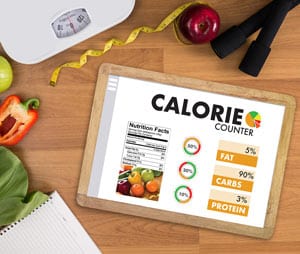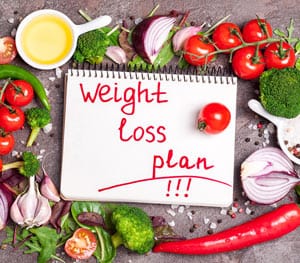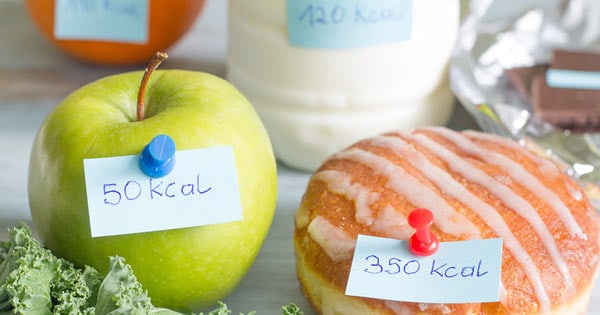How to Lose Weight Without Counting a Single Calorie
by Erika Slater
Are you an individual who’s desperately trying to lose weight or reduce the adipose fatty tissue on your body and you’ve resorted to ‘calorie counting’?
If you are, how’s it working for you so far? The truth is you may be barking up the wrong tree, or wrong supermarket isle!
While a popular chorus at one time with weight loss and nutrition gurus– “lose weight by burning more calories than you take in” – the fact is losing weight is more complicated than that.
Unfortunately, too many weight loss programs and regiments are geared toward counting calories which can be extremely tedious and time consuming. Trying to figure out just how many is too much, or too little can drive you mad!
Furthermore, it can become a chore in itself ‘counting calories’ and quickly you start to feel too much time and dedication needs to be put in, and this hasn’t even included the hours you spend at the gym!
Although counting calories can be a good place to start, it’s what is inside the calories you’re counting or not counting that matters most.
Let’s take a deeper look into the calorie counting mindset to see what makes sense and what doesn’t.
THE CALORIE COUNTING PHENOMENON:

As many of these counting calorie programs are designed for “average” person wanting to lose weight then they’re necessarily generic in nature – one size fits all.
Unfortunately, we come to this earth far from being a one size and this is the limitation for these programs.
Some though are good at setting the standards for what constitutes good calories.
Such as what foods provide the best bang for your chewing and swallowing, thus maximizing healthy returns.
But YOUR healthy weight loss program needs to take into account a variety of things; your metabolism, your current level of functioning in terms of exercise, the amount of sleep you’re getting, if you’re stressed out or not, hormonal changes and fluctuations, and the quality of the calorie itself.
Everyone’s metabolism varies and the proper ‘caloric counting’ should be based on metabolism, physical activity, age, gender, health etc. Many people elect to lose weight as part of a group or with a friend. This can be an issue as well. Essentially, what works for your diet buddy’s body may not work for you. Because of this it can quickly turn into a demoralizing relationship with food if you’re eating the same number of calories as your buddy but not losing at same rate or at all!
Are you beginning to see the basic issues with the calorie counting problem here?
MOVING TOWARDS HEALTHY WEIGHT LOSS:

First, I’m not a nutritionist but have got to a point in helping people lose weight, and my own personal journey, where I see some basic truths on healthy eating habits.
You may not like them at first… I’m not entirely sure I did… but they guide my eating habits each day now.
Eating healthy isn’t rocket science. It’s mostly plain sense.
Unfortunately, we tend to add confusion by insisting on wanting to “leave in” our favorite foods or those we associate ourselves with… such as pasta or potato.
We know vegetables and salads with some protein as meals usually offer the right level of nutrition and avoid you being absorbed in hour-by-hour calorie vigilance. Avoiding anything processed and which includes any hint of refined sugar lands you on a healthy planet as well.
Dairy and cholesterol are confusing areas for us all, especially as you get older and Doctor education tends to be behind the times on current thinking. Leaving dairy out from your diet altogether is a personal choice and you’ll need to experiment with it in your diet to establish if your body can live with it or abstinence is best policy.
Cholesterol is a more difficult balance and conflicting information perseveres as we learn more about it with more research and studies. Your personal level is the focus of much testing to determine your risk level for heart issues. If your cholesterol level is such medication is recommended – such as statins – do what you can on healthy living to avoid any prolonged medication.
When first engaging in a weight loss program, reach out to your physician, not for nutritional help but more to ensure there’s nothing medical that would impede you. Next, you need to incorporate the level of physical fitness you have in your life. If you’re training hard, then you’ll need more calories to sustain stamina, strength etc. This needs to be set and taken into account.
You’ll also want to take into account proper rest and sleep.

Perhaps the most intriguing part of any calorie is “What is in the calorie itself?”
Are your calories derived greatly in part from proteins, fats or carbohydrates? Are your fats primarily comprised of saturated or unsaturated fats, as after all, there are both good and bad fats.
Where are you deriving your proteins from; animal, fish or plants? You need to take cholesterol concerns into account.
Finally, where are your carbs coming from? Are they good sources of energy, as well as good fruit sugars, or are they derived from processed sugars and bleached flours?
You can count all the calories in the world and meet your daily intake, but if they’re from unhealthy sources, then you’re defeating your purpose.
Too many people believe just cutting calories down is enough, but it’s more about their quality.
One last thing, if you’re concerned with getting off the calorie counting carousel, then you might want to consider hypnosis. Hypnosis can help you with cutting out the bad calories, and help you stay focused on eating the good ones! I address this in my weight loss hypnosis service here.
Alternatively, if you’re ready to stop counting calories and develop a healthy relationship with food and don’t have access to a local hypnotist who can help then check out this self-hypnosis session here >>>
ADDITIONAL RESOURCES TO HELP STOP COUNTING CALORIES:
The Dos and Don’ts of Counting Calories – WebMD >>>
Why is it So Darn Hard to Lose Weight? And Keep It Off! >>>
Why is it So Darn Hard to Overcome Sugar Addiction? >>>
Introduction to Emotional Eating Disorder >>>
The Most Important Secrets to Permanent Weight Loss >>>
Now I’ve Lost Weight, How Do I Keep the Weight Off? >>>
What Foods are High in Refined Sugars? – Livestrong >>>
Can Red-Light Therapy Help You Get Rid of Your Spare Tire? >>>
Erika Slater CH
Free At Last Hypnosis
Massachusetts
CATEGORIES
FEATURED POSTS
Interested in making a significant change in your life and interested in learning more about what I do and how I do it? Discover my hypnotherapy services here or contact me here.

DISCOVER HOW TO START CHANGING HABITS TODAY.
In this free audio hypnosis session, you’ll experience the power of your subconscious mind to begin to change your habits. If you've never experienced hypnosis before then this is a great introduction...


